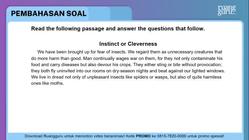Iklan
Iklan
Pertanyaan
Read the following passage and answer the questions that follow.
Instinct or Cleverness
We have been brought up for fear of insects. We regard them as unnecessary creatures that do more harm than good. Man continually wages war on them, for they not only contaminate his food and carry diseases but also devour his crops. They either sting or bite without provocation; they both fly uninvited into our rooms on dry-season nights and beat against our lighted windows. We live in dread not only of unpleasant insects like spiders or wasps, but also of quite harmless ones like moths.
Reading about them increases our understanding without dispelling our fears. Knowing that the industrious ants live in a highly organized society does nothing to prevent us from being filled with revulsion when we find hordes of them crawling over a carefully prepared picnic lunch. No matter how much we like honey, or how much we have read about the uncanny sense of direction which bees possess, we have a horror of being stung. Most of our fears are unreasonable, but they are impossible to erase. At the same time, however, insects are strangely fascinating. We enjoy reading about them, especially when we find that, like the praying rnantis, they lead perfectly horrible lives. We enjoy staring at them, entranced as they go about their business, unaware (we hope) of our presence. Who has not stood in awe at the sight of a spider pouncing on a fly, or a column of ants triumphantly bearing home an enormous dead beetle?
Last dry season I spent days in the garden watching thousands of ants crawling up the trunk of my prize peach tree. The tree has grown against a warm wall on a sheltered side of the house. I am especially proud of it, not only because it has survived several draughts, but because it occasionally produces luscious peaches. During the dry season, I noticed that the leaves of the tree were beginning to wither. Cluster of tiny insects called aphides were to be found on the underside of the leaves. They were visited by a large colony of ants which obtained a sort of honey from thein. I immediately embarked on an experiment which, even though it failed to get rid of the ants, kept me fascinated for twenty-four hours I bound the base of the tree with sticky tape, making it impossible for the ants to reach the aphides. The tape was so sticky that they did not dare to cross it. For a long time, I watched them scurrying around the base of the tree in bewilderment. I even went out at midnight with a torch and noted with satisfaction (and surprise) that the ants were still swarming around the sticky tape without being able to do anything about it. I got up early next morning hoping to find that the ants had given up in despair. Instead, I saw that they had discovered a new route. They were climbing up the wall of the house and then on to the leaves of the tree. I realized sadly that I had been comp.letely defeated by their ingenuity. The ants had been quick to find an answer to my thoroughly unscientific methods.
(Modified from Alexander, 1990: 732)
Choose the best answer by crossing A, B, C, D, or E. A lot of insects ____on the outside of the leaves.
Choose the best answer by crossing A, B, C, D, or E.
A lot of insects ____ on the outside of the leaves.
could be found
could found
could find
was to be seen
might find
Iklan
N. Puspita
Master Teacher
1
4.0 (1 rating)
Iklan
Iklan
Pertanyaan serupa
RUANGGURU HQ
Jl. Dr. Saharjo No.161, Manggarai Selatan, Tebet, Kota Jakarta Selatan, Daerah Khusus Ibukota Jakarta 12860
Produk Ruangguru
Bantuan & Panduan
Hubungi Kami
©2024 Ruangguru. All Rights Reserved PT. Ruang Raya Indonesia
















